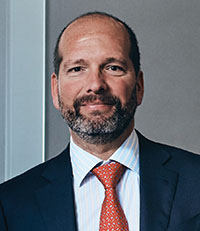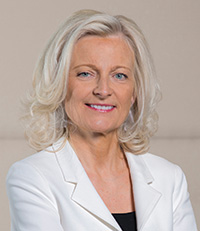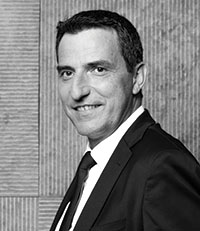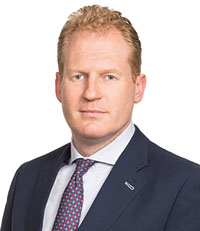Ahead of the Association of the Luxembourg Funds Industry (Alfi) Global Distribution Conference, Funds Europe asks delegates about tech, ESG and regulation.
GARY COLLINS, HEAD OF DISTRIBUTION EMEA AND LATIN AMERICA, COLUMBIA THREADNEEDLE
How has changing technology affected the distribution landscape?
Technology is having a fundamental impact in all areas of distribution and the broader supply chain. For example, the ability to bring together client data allows firms to identify trends, powers them to build more targeted products and provides greater information and services to deliver a more precise client outcome.
Do you think artificial intelligence will play more of a role in funds distribution in the future?
AI is a pretty broad church and I do think it could be deployed to help identify client needs in a more structured way. I believe the enhanced use of AI will complement client service rather than replace the need for people and, in turn, lead to a more engaged and informed client experience. However, the immediacy of receiving information will place the asset management industry under much more scrutiny. This is a trust-based business and although the digitisation of the industry will change the way we engage with our intermediaries and end clients, we will be judged on our efficacy and client outcomes.
We can foresee an augmented selling approach using technology and data as an enabler to the current model. I can also see the consolidation of digital platforms as new tech entrants enter the market place as disruptors and bring with them volume-driven solutions at lower prices. Whether this be Alibaba, Amazon or another platform, it is hard to predict.
 JEAN-MARC GOY, CONDUCTING OFFICER AND SENIOR COUNSEL, CAPITAL GROUP
JEAN-MARC GOY, CONDUCTING OFFICER AND SENIOR COUNSEL, CAPITAL GROUP
Do you foresee any regulatory challenges within the European funds industry over the next year?
There are several initiatives underway that will keep the industry busy in the coming year. One that springs to mind, which is becoming more important and has been gaining momentum over the last few years, is the area of responsible investment, sustainable finance and ESG [environment, social, governance] investing. From a regulatory viewpoint, it is crucial that the rules in this area strike the right balance, that they are clear and, perhaps more crucially, actionable in practice. The phenomenon of so-called ‘greenwashing’ – that is, entities claiming to be active in the field of sustainable finance, but with a dubious interpretation of the concept – should not be allowed and should be closely scrutinised. The European Commission has established an action plan, based among others on the COP21 agreement reached in Paris. The challenge will be to put the principles in practice and to make it work, in the interest of our planet and investors.
How would you describe the changing landscape of distribution in Europe?
The current distribution structure in Europe and Asia is largely based on intermediaries that are often large financial entities. Over time, this will become more and more electronic, digital and mobile. In this context, excellence in IT systems will be key for success. There are predictions that blockchain and the distributed ledger technology will play a growing role in the area of the distribution of investment funds but also in relation to their administration and to the depositary’s activities. Our IT experts are following these developments very closely to make sure that we are up to speed.
 CHRISTOPHER YIK, HEAD OF PRODUCT, EMEA, NIKKO ASSET MANAGEMENT
CHRISTOPHER YIK, HEAD OF PRODUCT, EMEA, NIKKO ASSET MANAGEMENT
What key change do you anticipate in global fund distribution?
Although Ucits remains the leading platform in cross-border funds distribution, I expect to see more activity in other markets in an attempt to compete with it. Already we have observed the launch of many other regional passporting regimes such as the Asean CIS Framework, Asia Region Funds Passport and various bilateral mutual recognition of funds between countries.
Asset managers will have to monitor this trend closely in manufacturing the right product for their target market of investors, along with other rising challenges such as fee compression and increased regulatory reporting requirements. Active investment management will continue to be a very crowded and competitive space, leading to the launch of more products that provide innovative solutions that deliver alpha as well as more passive products with lower fees for investors.
 KEN YAP, MANAGING DIRECTOR, CERULLI ASSOCIATES
KEN YAP, MANAGING DIRECTOR, CERULLI ASSOCIATES
What notable trends have you seen in funds distribution throughout Asia over the last few years?
In most Asian markets, traditional distribution channels continue to command the biggest share of mutual fund distribution, with banks holding a tight grip. In China, third-party online platforms are influential in gathering assets for money market funds. More than 40% of respondents surveyed by the Asset Management Association of China in 2018 said they would increase transactions with non-bank online platforms over the next year. Over in India, where banks have a market share of just 20%, competition in online distribution is heating up – last year’s increase in digital distribution activity spurred the growth of the direct channel.
Until the time online platforms are able to reach significant scale, banks will face no threat. Managers continue to rate traditional distributors the best in terms of raising assets as well as making profits.
Over the long term, online platforms with strong brands and shareholder backing could gain prominence, as millennials accumulate more wealth and lean towards online channels for investing in simple products.
 MICHÈLE EISENHUTH, INVESTMENT MANAGER PARTNER, ARENDT & MEDERNACH
MICHÈLE EISENHUTH, INVESTMENT MANAGER PARTNER, ARENDT & MEDERNACH
What are some of the main legal challenges facing the European fund industry?
Among the multiple challenges facing the fund industry in Europe, supervisory convergence, the emergence of crypto assets and the digitalisation of our industry will certainly appear in the top ten concerns of all asset managers.
The long process of supervisory convergence started in 2008 in the aftermath of the financial crisis. In the shadow of the Capital Markets Union (CMU), the idea of the European Commission to increase the powers of Esma [European Securities and Markets Authority] through, in particular, the Supervisory Coordination Network, creates challenges and even uncertainties in a world that needs certainty, continuity and transparency. As part of the convergence effort, Esma published several consultation papers, notably to issue guidance on liquidity stress tests and to regulate performance fees in Ucits, both key concerns when it comes to investor protection. Another of their key concerns is the transparency regime established under MiFID II in relation to information on costs and charges that must be provided to investors. The protection of investors is of paramount importance for the enhancement of retail investor participation in capital markets, the ultimate goal of CMU.
When it comes to crypto assets, the first challenges are classification and custody. Differences in classification and newest regulations versus IFRS may have an impact on their regulatory treatment, their valuation and accounting principles, and thus their custody.
It is also clear that artificial intelligence has already found its way to our industry. It is no longer a matter of when but how and how fast we will be able to take advantage of that revolution.
How do you expect the regulatory landscape to change over the next couple of years?
ESG will most likely continue to see increased focus for asset managers based on shareholder, client and regulator demands. Return on investment is no longer the only objective of the majority of investors.
Appropriate substance in relevant locations, be it for fund managers or MiFID firms, will continue to be in the spotlight. One player made an interesting comment the other day: assessing compliance of their business model with the Esma requirements in the Brexit context has created the opportunity to broadly rethink their whole model on even stronger governance.
Besides the CMU, which seeks to develop new financing opportunities for SMEs and enlarge the investment opportunities in long-term projects for savers in the EU, new pension product solutions are also being instigated to meet the demand for long-term investments. Generation X, baby boomers and millennials have different needs. In Europe it is worth mentioning the new regulation that introduces the pan-European personal pension product which should similarly give rise to new market and investment opportunities.
 SONIA HIERZIG, SENIOR PROJECTS MANAGER FOR CLIMATE CHANGE, SHAREACTION
SONIA HIERZIG, SENIOR PROJECTS MANAGER FOR CLIMATE CHANGE, SHAREACTION
How do you expect climate change to affect the funds industry?
Climate change poses a number of risks to the funds industry. This includes the physical risks linked to an increase in floods, droughts and extreme weather events, as well as rising sea levels, which will impact investee companies. It also includes transition risks linked to switching to a low-carbon economy, such as regulatory changes and technological developments, which fund managers need to anticipate. Some of these risks can be mitigated by clever capital allocation and by engaging with companies on climate-related risks to ensure they are adequately prepared. On the other hand, climate change also comes with the opportunity to invest in low-carbon solutions and to contribute to meeting the global targets of the Paris Agreement on climate change.
What are you most looking forward to discussing at this year’s conference?
I am looking forward to discussing how environmental, social and governance issues can be better integrated into investment processes. Eighty-four per cent of pension scheme members in the UK say they would prefer a pension that uses investments to encourage companies to be more responsible, according to research by Legal & General Investment Management. Millennials in particular are more likely to care about the sustainability of the companies their money is invested in, so the number of requests for more sustainable investment opportunities is only going to grow. Are fund managers ready to satisfy this demand and provide green solutions?
 PHILLIPPE BOURGUES, MANAGING DIRECTOR, CACEIS BANK, LUXEMBOURG BRANCH
PHILLIPPE BOURGUES, MANAGING DIRECTOR, CACEIS BANK, LUXEMBOURG BRANCH
Is there enough regulation of the funds industry in Europe, or perhaps too much?
The key point to consider is whether the regulations are functioning as intended rather than there being too much or too little of them. This is broadly the case, but an industry with so much at stake – not just the protection of investors but also financing of the economy – is always going to be closely regulated.
Wherever a vacuum or failure is identified at national, European and international level, regulators propose measures, such as in response to 2008’s crisis. There are definitely important points to be discussed with regard to appropriate phasing of introduction of new regulations so as not to stifle innovation for asset managers and asset servicing providers, or raise costs so high as to create an inefficient market.
Are there any specific regulations you believe to be a help or a hindrance?
We expect future regulations to address remaining harmonisation and clarification issues such as in MIFID and PRIIPs, that arise often due to imprecisely defined terms and overlapping/contradictory reporting obligations. This also applies to definitions within the framework of ESG investment, in which Solvency II and the Insurance Distribution Directive have conflicting requirements regarding integration of sustainability risks.
Further steps should also be taken to clarify overlapping and contradictory measures through regular consultation between regulators and stakeholders, which would also avoid unrealistic implementation deadlines such as that of SRD II. Finally, despite the lofty promises of fintech, new regulation should properly weigh risks/rewards along the value chain, taking care to factor in the central role of the asset servicing provider as a trusted third party.
 MARC-ANDRÉ BECHET, ALFI DIRECTOR, LEGAL AND TAX
MARC-ANDRÉ BECHET, ALFI DIRECTOR, LEGAL AND TAX
What trends do you expect to see in the European funds industry over the next couple of years?
There are many opportunities for development requiring resources and investment, but there is also a need to continuously digest new regulations impacting our industry, in an environment of reduction in margins.
We expect Ucits and AIFs to be key beneficiaries of the launch of the Capital Markets Union, aiming to increase investment and the choices available to retail and institutional investors in Europe and to migrate some of the vast pool of deposit savings into capital markets and investment funds.
The global footprint of Ucits will surely serve well in the following decades as populations in many markets are encouraged by their governments to take on the mantle of voluntary third-pillar pensions. Furthermore, the alternative fund industry is set to double in size by 2023. Investors are increasingly more sophisticated and allocating heavily to alternatives as they hunt for yield and seek greater diversification.
One final key priority is ESG and green finance, which the European Commission has ambitious plans for. Around a third of ESG funds in Europe are domiciled in Luxembourg. ESG will become mainstream once the taxonomy and its implementation are stated clearly.
Alfi’s Global Distribution Conference takes place at the European Convention Center, Luxembourg on September 24-25.
©2019 funds europe





